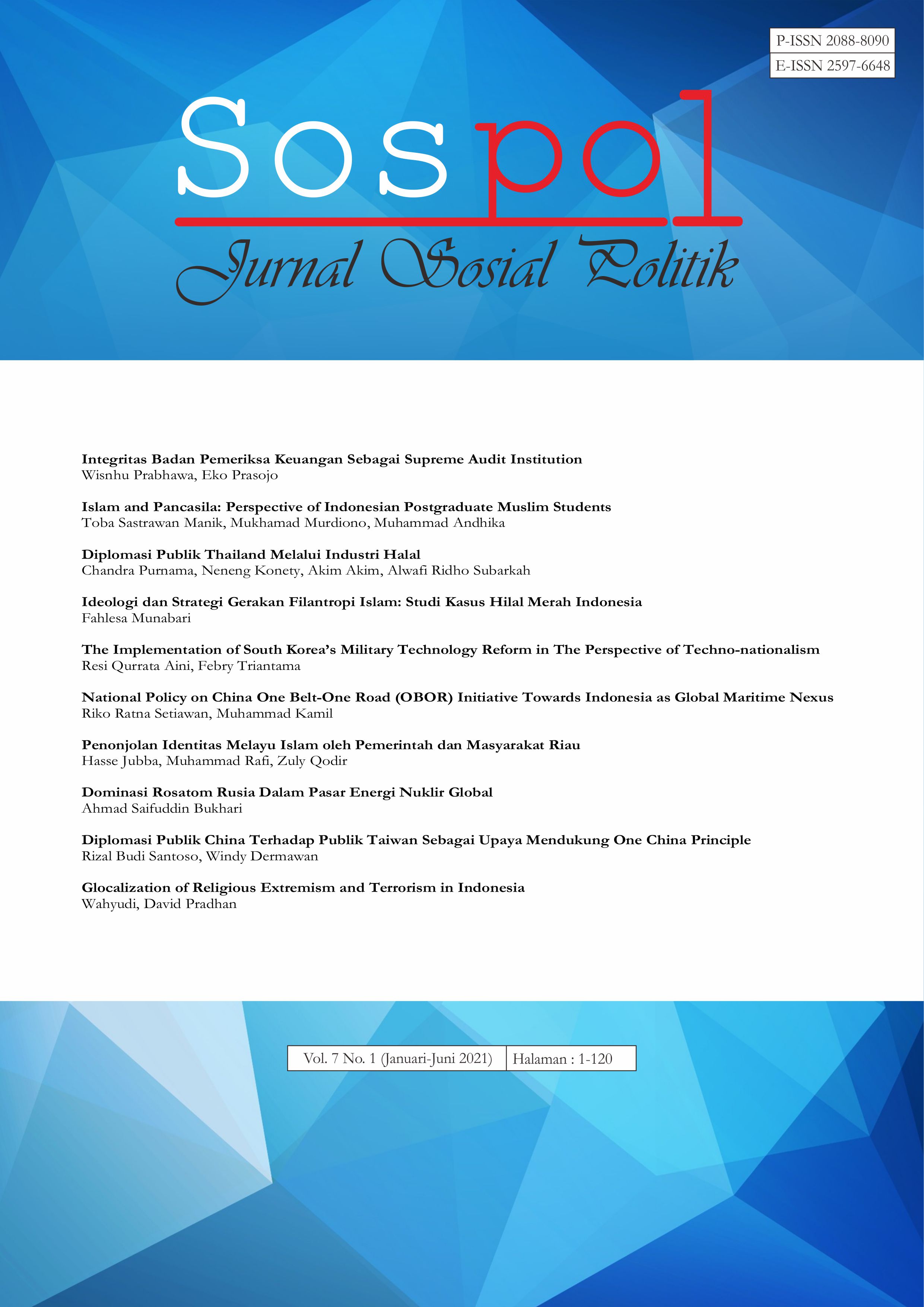Glocalization of Religious Extremism and Terrorism in Indonesia
DOI:
https://doi.org/10.22219/sospol.v7i1.15959Keywords:
Extremism, Intermestic Politics, Religion, TerorismAbstract
The rise of religious interpretation based political extremism culminating in violent terrorism is a serious threat confronting Indonesia in the 21st Century. The ostensibly multifarious and heterogenous impetus behind the origin of the resort to terrorism notwithstanding, the prevalent reductionist obscurantism surrounding the complexities underlying political violence justified through a religious referential, warrant academic re-interrogation, for deciphering the authenticity of the extant Western-dominated hypothetical paradigms. This theoretical, analytical Article, based exclusively on secondary sources, seeks to critically reinterpret the international and domestic factors that inspire terrorism in Indonesia. Drawing from the dominant theoretical explications and discourses accounting for the phenomenon of the proliferation of intermestic terrorism, the Article adopts a structural realist framework for interrogating the inductive effects of International politics on domestic terrorism in Indonesia.
Downloads
References
Ali-Fauzi, I. (2018). Nationalism and islamic populism in Indonesia. Heinrich Böll Stiftung.
Almond, G. A., Appleby, R. S., & Sivan, E. (2003). Strong religion: The rise of fundamentalisms around the world. University of Chicago Press.
Amal, I. (1992). Regional and central government in Indonesian politics: West Sumatra and South Sulawesi. Gadjah Mada University Press.
Amenta, E., Caren, N., Chiarello, E., & Su, Y. (2010). The political consequences of social movements. Annual Review of Sociology, 36, 287–307. https://doi.org/10.1146/annurev-soc-070308-120029
Annual report on Religious Life in Indonesia 2013. (2013). Ministry of religious affairs of republic of Indonesia, laporan tahunan kehidupan keagamaan di Indonesia tahun 2013. Jakarta: Kementerian Agama.
Aspinall, E., & Greg, F. (2003). Eds. Local power and politics in Indonesia: Decentralisation and democratisation. ISEAS.
Asshiddiqie, J. (2006). Konstitusi dan konstitusionalisme indonesia. Sekjen dan Kepaniteraan MK RI.
Assyaukanie, L. (2009). The constitutional law of Indonesia. Sweet & Maxwell Asia.
Ayoob, M. (2015). The Many Faces of Political Islam : Religion and Politics in the Muslim World This document is downloaded from DR-NTU , Nanyang Technological University Library , Singapore . Author ( s ) Rights. November.
Barratt, S. (2004). Implementation studies: Time for a Revival? personal reflections on 20 years of implementation studies. Public Administration, 82(2), 249–262.
Barton, G. (2005). Jemaah islamiyah: Radical islamism in Indonesia. Ridge Books.
Bell, I., Feith, H., & Hatley, R. (1986). The West Papuan Challenge to Indonesian Authority in Irian Jaya Old Problems, New Possibilities. Asian Survey, 26(5), 539–556. https://doi.org/10.2307/2644481
Buehler, M. (2013). Revisiting the inclusion-moderation thesis in the context of decentralized institutions: The behavior of Indonesia’s Prosperous Justice Party in national and local politics. Party Politics, 19(2), 210–229. https://doi.org/10.1177/1354068812462933
Burhani, A. N. (2013). Liberal and conservative discourses in the Muhammadiyah: The struggle for the face of reformist Islam in Indonesia. In M. van Bruinessen (Ed.), Contemporary developments in Indonesian Islam: Explaining the ‘conservative turn.’ Institute of Southeast Asian Studies.
Cahyono, H. (1992). Peranan ulama dalam Golkar 1971–1980: dari Pemilu sampai Malari. Pustaka Sinar Harapan.
Chase, R., Hill, E., & Kennedy, P. (1999). The pivotal states: A new framework for U.S. Policy in the developing world.
Cochrane, J. (2014). In a nation of muslims, political Islam is struggling to win votes. The New York Times. www.nytimes.com/2014/04/08/world/asia/political-islam-indonesia.html?_r=0
Conboy, K. (2003). Kopassus: Inside Indonesia’s special forces. Equinox Publishing.
Crenshaw, M. (1998). The Logic of Terrorism: Terrorist Behavior as a Product of Strategic Choice.” In Walter Reich (ed.), Origins of Terrorism: Psychologies, Ideologies, Theologies, States of Mind. Woodrow Wilson Center Press.
Cronin, A. K. (2013). Behind the curve Globalization and international Terrorism. International Security, 27(3), 30–58. https://doi.org/10.1038/scientificamerican0295-99
Daniel, P. (2003). Militant islam reaches America. New York: W.W. Norton.
Denmark, A. M., Sukma, R., & Parthemore, C. (2010). Crafting a Strategic Vision: a New Era of U.S.-Indonesia Relations. Center for a New American Security.
Djafar, W. (2010). Menegaskan Kembali Komitmen Negara Hukum: Sebuah Catatan Atas Kecenderungan Defisit Negara Hukum Di Indonesia. Jurnal Konstitusi, 7(5), 151–174. https://doi.org/10.31078/jk
Duncan, C. R. (2005). The other Maluku: Chronologies of conflict in North Maluku. Journal Storage (JSTOR), 80, 53–20. https://www.jstor.org/stable/3351319
El Fadl, K. A. (2005). The great theft: Wrestling Islam from the extremists. Harper.
Eubank, W., & Leonard, W. (1994). Does democracy encourage terrorism? Terrorism and Political Violence, 6(4).
Fair, C. C., & Shepherd, B. (2006). Who supports terrorism? Evidence from fourteen Muslim countries. Studies in Conflict and Terrorism, 29(1), 51–74. https://doi.org/10.1080/10576100500351318
Farida, M. (2005). Dasar-dasar ilmu politik. Gramedia Utama Persada.
Federspiel, H. M. (2004). Labirin Ideologi Muslim. PT Serambi Ilmu Semesta.
Feillard, A., & Madinier, R. (2006). L’islam Indonésien face à la tentation radicale de 1967 à nos jours. Institut de Recherche sur l’Asie du Sud-Est Contemporaine.
Gause, F. G. (2005). Can democracy stop terrorism? Foreign Affairs, 84(1), 62–76.
Gellert, P. K. (2015). Optimism and Education: The New Ideology of Development in Indonesia. Journal of Contemporary Asia, 45(3), 371–393. https://doi.org/10.1080/00472336.2014.978352
Gerges, F. A. (2005). The far enemy: Why jihad went global. Cambridge University Press.
Gold, D. (2003). Hatred’s kingdom: How Saudi Arabia supports the new global terrorism. Regnery Publishing.
Greenawalt, K. (2005). History as ideology: Philip mamburger’s separation of church and state. California Law Review, 93(1), 367–396. https://www.jstor.org/stable/3481394
Greg, F., & Hooker, V. (2006). Voice of Islam in Southeast Asia: A contemporary sourcebook. Singapore: Institute of Southeast Asian Studies.
Habermas, J. (1984). The theory of communicative action”, in reason and the rationalization of society (1st ed.). Beacon Press.
Harris, S. (2005). The end of faith: Religion, terror, and the Future of reasonle. The Free Press.
Haseman, J., & Lachica, E. (2005). Toward a Stronger U.S.-Indonesia security relationship. USINDO.
Hedges, C. (2009). When atheism becomes religion: A,erica’s new fundamentalism. Free Press.
Hefner, R. W. (2010). Religious resurgence in contemporary Asia: Southeast Asian perspectives on capitalism, the state, and the New Piety. Journal of Asian Studies, 69(4), 1031–1047. https://doi.org/10.1017/S0021911810002901
Hoffman, B. (2004). The Changing Face of Al Qaeda and the Global War on Terrorism. Studies in Conflict and Terrorism, 27(6), 549–560. https://doi.org/10.1080/10576100490519813
Huntington, S. P. (1993). The clash of civilizations? Foreign Affairs, 72(3). https://doi.org/https://doi.org/10.2307/20045621
Hwang, J. C. (2010). When parties swing: Islamist parties and institutional moderation in Malaysia and Indonesia. South East Asia Research, 18(4), 635–674. https://doi.org/10.5367/sear.2010.0016
Joseph, K., & Tim, W. (2002). No TitleWorls leaders rethinking strategy in Aid to poor. https://www.nytimes.com/2002/03/18/world/world-leaders-rethinking-strategy-on-aid-to-poor.html
Khondker, H. (2004). Glocalization as globalization: Evolution of a sociological concept. Bangladesh E-Journal of Sociology, 1(2), 1–9.
Kurniawati, D. E. (2017). Intermestic Approach: A Methodological Alternative in Studying Policy Change. PCD Journal, 5(1), 147. https://doi.org/10.22146/pcd.26293
Lapidus, I. M. (1991). A history of Islamic societies. Cambridge University Press.
Li, Q. (2005). Does democracy promote or reduce transnational terrorist incidents? Journal of Conflict Resolution, 49(2), 278–297. https://doi.org/10.1177/0022002704272830
Lindsey, T. (2008). When words fail: Syariah law in Indonesia – Revival, reform or transplantation. Comparative Legal Studies in Asia. https://doi.org/https://doi.org/10.1163/ej.9789004165182.i-354.58
Lipset, M., & Rokkan, S. (1968). Party Systems and Voter Alignments: Cross-National Perspectives (Vol. 62). Cambridge University Press. https://doi.org/https://doi.org/10.2307/1953444
Mamdani, M. (2004). Good Muslim, bad muslim: America, the cold war, and the roots of terror. New York: Pantheon.
Meyer, D. S., & Minkoff, D. C. (2004). Conceptualizing political opportunity. Social Forces, 82(4), 1457–1492. https://doi.org/10.1353/sof.2004.0082
Micklethwait, J., & Wooldridge, A. (2009). God is back: How the global revival of faith is changing the world reprint. Penguin Press.
Miller, M. A. (2008). Rebellion and Reform in Indonesia. In Rebellion and Reform in Indonesia. https://doi.org/10.4324/9780203888193
Mydans, S. (2007). Religiosity, not radicalism is new wave in Indonesia. The New York Times. https://www.nytimes.com./3224/193 Accessed 18 Nov 2020.
Nasr, R. V. (2001). Islamic Leviathan. Oxford University Press.
Nasution, & Buyung, A. (1992). The aspiration for constitutional government in Indonesia: A socio-legal Study of the Indonesian konstituante. Pustaka Sinar Harapan.
Noor, F. (2011). The PKS in the landscape of Indonesian islamist politics: Cadre-Training as mode of preventive radicalisation?”. S. Rajaratnam School of International Studies.
Noorani, A. . (2002). Islam and jihad: Prejudice versus reality. New York: Zed Books.
Pape, R. A. (2003). The Strategic Logic of Suicide Terrorism. American Political Science Review, 97(3), 343–361. https://doi.org/10.1017/S000305540300073X
Permata, A.-N., & Kailani, N. (2010). Islam and the 2009 Indonesian Elections, Political and Cultural Issues. Islam and the 2009 Indonesian Elections, Political and Cultural Issues, August 2020. https://doi.org/10.4000/books.irasec.754
Platzdasch, B. (2009). Islamism in indonesia: Politics in the emerging democracy. Institute of Southeast Asian Studies.
Robertson, R. (2012). Globalisation or glocalisation? Journal of International Communication, 18(2), 191–208. https://doi.org/10.1080/13216597.2012.709925
Rudnyckyj, D. (2010). Spiritual economies: Islam, globalization, and the afterlife of development. Cornell University Press.
Rutheven, M. (2007). Fundamentalism: A Very Short Introduction. Oxford University Press.
Said, E. W. (1978). Orientalism. Pantheon Books.
Schmid, A. (1993). Terrorism and democracy,” in Alex Schmid and Ronald Crelinsten, (eds.). London: Frank Cass.
Schwartz, S. (2002). The two faces of islam. New York: Random House.
Shermer, M. (2003). How we believe: Science, skepticism and the search for God (2nd ed.) (Holt (ed.)).
Simons, A. (2015). Making Enemies : An Anthropology of Islamist Terror , Part I Calhoun : The NPS Institutional Archive Making Enemies : An Anthropology of Islamist Terror , Part I. January 2006.
Slackman, M. (2006). Bin laden says west is waging war against islam. New York Times.
Sorman, G. (2004). The children of Rifaa: In search of a moderate Islam (trans: Puri, A.). Penguin Press.
Suminto, H. A. (1985). Politik islam hindia belanda. LP3ES.
Tanuwidjaja, S. (2010). Political islam and islamic parties in Indonesia: Critically assessing the evidence of islam’s political decline. Contemporary Southeast Asia: A Journal of International and Strategic Affairs, 32(1), 29–49. https://muse.jhu.edu/article/380023/pdf
Teik, B. K., Hadiz, V., & Nakanishi, Y. (2014). Between dissent and power: The transformation of islamic politics in the middle east and asia. London: Palgrave Macmillan.
Vatikiotis, R. J. M. (1997). Indonesia politics under Suharto order, development and pressure for change. London, New York: Routledge.
Zimmerman, J. C. (2004). Sayyid Qutb’s influence on the 11 September attacks. Terrorism and Political Violence, 16(2), 222–252. https://doi.org/10.1080/09546550490480993
Downloads
Published
How to Cite
Issue
Section
License
Copyright (c) 2021 Wahyudi, David Pradhan

This work is licensed under a Creative Commons Attribution-NonCommercial-ShareAlike 4.0 International License.
Authors who publish with this journal agree to the following terms:
- Authors retain copyright and grant the journal right of first publication with the work simultaneously licensed under a Creative Commons Attribution-ShareAlike 4.0 International License that allows others to share the work with an acknowledgement of the work's authorship and initial publication in this journal.
- Authors are able to enter into separate, additional contractual arrangements for the non-exclusive distribution of the journal's published version of the work (e.g., post it to an institutional repository or publish it in a book), with an acknowledgement of its initial publication in this journal.
- Authors are permitted and encouraged to post their work online (e.g., in institutional repositories or on their website) prior to and during the submission process, as it can lead to productive exchanges, as well as earlier and greater citation of published work (See The Effect of Open Access).

This work is licensed under a Creative Commons Attribution-ShareAlike 4.0 International License.



















